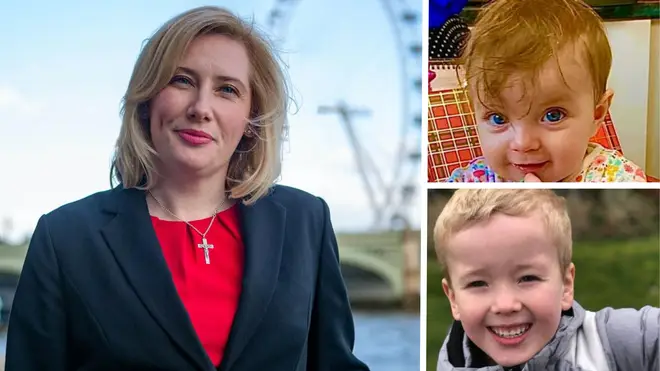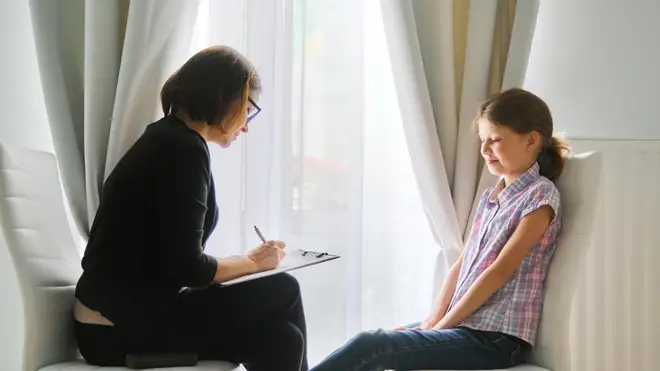
Ben Kentish 7am - 10am
25 January 2022, 08:39 | Updated: 25 January 2022, 15:27

Half of social workers have raised concerns about vulnerable children – with no proper action taken to protect them as a result, an exclusive survey for LBC has revealed.
And a third say that’s happened at least five times in the last 18 months.
The shocking figures come just weeks after the harrowing murders of six-year-old Arthur Labinjo-Hughes, and one-year-old Star Hobson came to light in court.
Whistle blowers have told LBC vulnerable children are at risk of serious harm because they are "dangerously" overstretched, with hundreds leaving the profession due to stress.
In the survey by the Social Workers Union for LBC, 58% of social workers said their caseloads are unmanageable, with almost all - 97% - saying that the vulnerable would be better protected if caseloads were lighter.
One child protection worker in the West Midlands told LBC she’s been responsible for 50 children at once, even though the safe cap should be between 15-25.
She said: "It got to the point where I felt like I was a walking zombie.
"I wasn’t sleeping, and I was just getting on with the long days the next day. I became physically unwell and had to take some time off work. I came back and things were still crazy, and I had to be signed off by my doctor.
"But the worry comes in - it’s children, you want to see them. You have to find a way to manage it, but it’s so difficult. I’ve had countless worried sleepless nights, it’s never ending."
Read more: PM faces fresh outrage over lockdown 'birthday bash' after asking Brits to cancel parties
Read more: Driver arrested on suspicion of killing man after woman stabbed to death in west London

Another child protection worker, who has been visiting vulnerable children for three and a half years, told LBC: "Your case load, the majority of the time, is a lot higher than it should be.
"My cap is 15-20 cases [children] at one time, but it has been a lot more. More experienced social workers have a cap of 25, but I’ve known them to be on 35. You have to visit them, make sure they’re safe, complete risk assessments, and then within that things happen unexpectedly which delays the work even further.
"We will say it’s not safe, but where do they go? Where else are these children going to go? Someone needs to have them."
Another children’s social worker, who wished to remain anonymous, said: "Raising concerns about the lack of action on cases is the norm.
"However, with a lack of resources, it is difficult to take the right action at the right time. Managers hear and listen to us, but it's the way the system is, and we have had to learn to accept it."
Read more: Half-term holiday boost as tests for jabbed travellers returning to England will be axed
The survey by the Social Workers Union and LBC found half of the 824 respondents are considering quitting their job because of stress and “unsafe” workloads.
The survey also found:
Former shadow children’s minister Emma Lewell-Buck worked as a children’s social worker before being elected the Labour MP for South Shields.
She told LBC: "There were times where my manager would allocate me work and I wouldn’t even know about it - because everyone was just trying to get stuff off their desk and pass it on to the next person. It was a dangerous environment to be working in.
"I can’t imagine what it’s like now when you’ve had over 10 years of cuts from a government hell bent on privatisation, deregulation, increasing bureaucracy and cutting all of those services that you rely on.
"When the current Secretary of State for Education Nadhim Zahawi was Children’s Minister, I was his shadow, and I warned him that all of this would lead to the loss of a child’s life and I was ignored. In a short space of time recently we’ve had two precious children murdered in the most horrific circumstances."

David Fawcett: social service response to Star's case was 'unacceptable'
In June 2020, six-year-old Arthur Labinjo-Hughes was poisoned, starved and beaten in a campaign of "evil" abuse at the hands of his father’s girlfriend Emma Tustin. He suffered an "unsurvivable brain injury".
Tustin, 32, was sentenced to life with a minimum of 29 years at Coventry Crown Court in December 2021 and Arthur's father, Thomas Hughes, 29, was sentenced to 21 years in prison after being convicted of manslaughter.
In September 2020, 16-month-old Star Hobson was murdered by her mother’s partner, Savannah Brockhill, following months of abuse.
Brockhill, 28, was jailed for a minimum of 25 years, whilst Star’s mother Frankie Smith, 20, was given 8 years for causing or allowing her daughter’s death.
It emerged that family members of both children had been reporting fears for their safety to social workers before they were murdered.
Asked if those deaths could have been prevented if funding and resources for the social care system were greater, Ms Lewell-Buck said: "Of course. Nobody can sustain that level of lack of sleep, that level of work and that level of trauma without at some point potentially missing something.
"There will always be people out there who do unspeakable and horrific things to children but if the support services are there, and the services there to protect them from that harm are resourced properly - and those working in it aren’t under that level of stress - then they won’t miss things."
Former Children's Commissioner for England Anne Longfield said on LBC: "What used to be a caseload 10 years ago of 15 [children] is now 50 and that means that there's just not the time, there's just not the experience, the oversight to make really important judgements that are needed to be able to help families keep children safe," she told LBC's Shelagh Fogarty.
"But also, if they are in danger, to make sure those children are protected.
"So I think the review of Arthur’s case… and Bradford, I think they will be very illustrative in what going on in many other places in the country."
John McGowan, General Secretary of the Social Workers Union, said: "This recent member survey has highlighted what the reality of being a social worker in 2022 is and reflects the pressures our members are presently under.
"It is a great concern that half of social workers are considering leaving the profession due to the pressures of the work and the impact the work is having on their mental health.
"Social work intervention can greatly improve the quality of life and opportunities for the children, families, adults and communities we support 24/7. However, it is fair to say that unless the pressures we are under are addressed we will not be able to reach the very people who need our service and support."
A Department for Education spokesperson said: "Social workers are often our unsung heroes, doing their best in very difficult jobs, and their welfare and wellbeing is of huge importance. Every social worker should benefit from good professional development, and we are also investing in fast-track training and recruitment programmes targeted at high-quality graduates.
"Local authorities have access to a number of mental health services to support their social workers, and we also organise peer-to-peer support sessions for social workers to help them share best practice and the challenges they face.
"We recognise the pressure on children’s services, which is why we are providing councils with £4.8 billion in new grant funding to help maintain vital frontline services, including children’s social care."